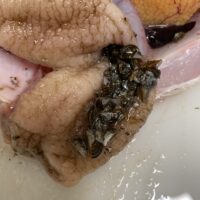What we know
Researchers gathered data from 21 Minnesota lakes to examine the impact zebra mussels have on the aquatic ecosystem.
They found that fish in lakes infested with invasive zebra mussels had much higher concentrations of mercury – a potent neurotoxin that threatens both aquatic life and human health.
Walleye in lakes infested with zebra mussels were shown to have 72% higher amounts of mercury compared to lakes without them.
The study also states that “average-sized walleye were more than twice as likely to exceed mercury thresholds tied to human health.”
The Minnesota Department of Health’s threshold for mercury concentrations is 0.22 parts per million, and the study notes walleye in zebra mussel-infested lakes reached that concentration at a much smaller size, specifically 14 inches instead of 18 inches.
Meanwhile, yellow perch showed a 157% higher concentration of mercury in lakes with zebra mussels, with an average-sized perch having a risk 50 times higher of exceeding the mercury level threshold considered acceptable for human health.
The study also found walleye and perch are relying more on nearshore feeding habits because of the zebra mussel invasion.
The study was done by researchers from the University of Minnesota’s College of Food, Agricultural and Natural Resource Sciences, Minnesota Aquatic Invasive Species Research Center, and the U.S. Geological Survey. It was also published in the peer-reviewed journal, Science of the Total Environment.
More zebra mussels discovered at Lake Ann in Chanhassen
Associate Professor in the Department of Fisheries, Wildlife and Conservation Biology and senior author of the study Gretchen Hansen said, “We were surprised to find such a large effect of zebra mussels in fish tissue mercury concentrations, and we are eager to conduct further research to understand exactly the mechanism behind these patterns.”
